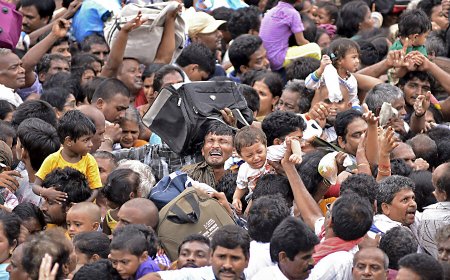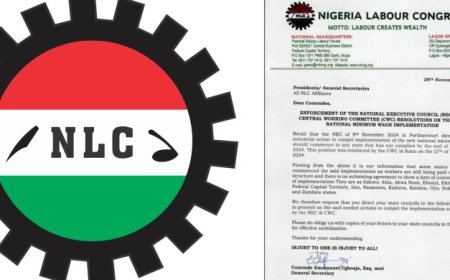NIGERIA'S EDUCATION DILEMMA: Formal Education, Skill Acquisition or Both?
This article discusses the importance of both formal education and skill acquisition in Nigeria's developing economy. While formal education provides a solid foundation, skill acquisition is essential for practical experience and adaptability in the job market. The Nigerian government has implemented policies to promote vocational training and skills development, but challenges persist. Prioritizing investment in education and skills development is crucial for creating a skilled and adaptable workforce. Discover the importance of balancing formal education and skill acquisition in Nigeria's economy. Learn how combining both can drive economic growth and development.

Education is more than just the acquisition of knowledge; it's a transformative journey that empowers individuals to understand, analyse, and engage with the world around them. It's a process that nurtures critical thinking, fosters creativity, and equips people with the tools to make informed decisions.
The World Bank Group (2024) gave a very interesting overview on Education, defining the concept as “a human right, a powerful driver of development, and one of the strongest instruments for reducing poverty and improving health, gender equality, peace, and stability.” This puts forward how important education is in the life of an individual and a nation at large.
Formal education is an organized and regulated system of education, which follows a curriculum and awards recognized academic certificates or degrees. This type of education is given in schools, colleges, official institutions and universities, either in person or through e-learning platforms. Generally, formal education is governed by educational norms and standards and is delivered through formal academic programs. Students advance from one educational level to another by completing courses and/or earning academic credit. Primary education, a university degree or a business leadership program are examples of formal education.
Skill acquisition involves acquiring, developing, and improving specific abilities through learning and practice. It involves acquiring cognitive and physical skills, ranging from essential motor to complex cognitive abilities. It encompasses the steps taken to learn and master a particular skill, starting from the initial stages of learning to the point where the skill becomes automated and can be performed effortlessly.
In Nigeria, the concept of education has its history with the arrival of the missionaries. According to the National Bureau of Statistics (2015), formal education in Nigeria began when the first primary school opened its doors in 1843 in Badagry, Lagos. This school was then owned by the Methodist missionaries, marking the first evidence of private sector stimulated delivery of education in Nigeria. Following this, was the flag-off of secondary school education in Nigeria by Christian missionaries with the establishment of the C.M.S Grammar School also in Lagos in 1859. By the year 1914, when both the Northern and Southern Protectorates were amalgamated, there were a total of 59 government and 91 mission primary schools in the South; all 11 secondary schools except for King’s College Lagos were run by Missions. These educational developments were aimed at equipping Nigerian citizens with the knowledge and skills necessary to contribute meaningfully to the nation’s development and meet the increasingly complex demands of a rapidly changing world.
The expansion and advancements in Nigeria’s educational system during this era played a pivotal role in shaping the country’s growth trajectory. Education became a catalyst for economic development, social cohesion, and empowerment of individuals and communities. In 1999, the Nigerian government introduced the Universal Basic Education (UBE) Program. This program aimed to provide free, compulsory, and quality education for all children between the ages of 6 and 15. In 2004, Nigeria transitioned from the 6-3-3-4 educational structure to the 9-3-4 system. The 6-3-3-4 structure consisted of six years of primary education, three years of junior secondary education, three years of senior secondary education, and four years of tertiary education.
Undoubtedly, formal education is a key aspect in the academic development of an individual. Through pre-established content, students not only acquire a knowledge base, but can also develop analytical skills, critical thinking and problem-solving abilities. In the professional field, formal education also plays a significant role. In an article released by the Vents Magazines (2024), formal education often culminates in degrees, diplomas, and certificates that carry credibility and recognition. These credentials can significantly enhance an individual’s professional standing in the job market. Employers often value the structured learning and specialized knowledge gained through formal education, making it a key factor in career advancement. Certificates and degrees validate that a person has the necessary knowledge for a certain job. But, in addition, it gives professionals a theoretical basis that can be applied in real work contexts.
Schools and universities serve as social environments where students interact with peers, fostering social skills and collaborative learning. Networking opportunities abound, allowing individuals to build relationships that may prove beneficial in their future careers. Group projects, extracurricular activities, and social events contribute to a well-rounded educational experience.
Skill acquisition is a culmination of movement mechanics, physical literacy, biomechanics, athletics development, psychology and coaching practice. The development of skill, and the ability to learn, improve and develop performance, is central to sport and physical activity. It plays an indispensable role in every individual’s journey in sport, irrespective of their previous experiences and goals for the future.
It is no longer news that there is scarcity of jobs in Nigeria. You don’t have to depend on your certificate alone to get you something to survive on. Know all about skills acquisition in Nigeria to improve your standard of living at once.
The world is undergoing constant change, driven by technological innovations, economic shifts, and global challenges. Individuals who can adapt to these changes are better positioned for success. Skills acquisition provides a means for individuals to stay relevant and adaptable in an ever-evolving job market. Whether it’s learning new programming languages, mastering digital tools, or acquiring soft skills like communication and problem-solving, a diverse skill set enables individuals to navigate and thrive in diverse environments.
In a competitive job market, employers seek candidates with a versatile skill set that goes beyond academic qualifications. Skills acquisition allows individuals to differentiate themselves from their peers and demonstrate their ability to contribute effectively in various roles. Continuous learning not only enhances employability but also increases the chances of career advancement. Employers are more likely to invest in individuals who show a commitment to self-improvement and possess a wide range of relevant skills.
The interconnectedness of the globalized world requires individuals to possess cross-cultural communication skills and an understanding of diverse perspectives. Skills acquisition, especially in areas such as intercultural communication, teamwork, and adaptability, enables individuals to thrive in an increasingly interconnected world. It promotes collaboration across borders and contributes to building a more inclusive and collaborative global community. Skills acquisition helps individuals adapt to the ever-changing professional landscape and market demands.By staying updated with current trends and new technologies, individuals can remain relevant and agile in their chosen field.
Acquiring new skills enables individuals to develop innovative solutions and think critically.By broadening their knowledge base, individuals can approach challenges from various perspectives, resulting in more creative and innovative solutions.
Now, examining both sides, with the current situation of survival in Nigeria, it will be a best option to acquire the knowledge and practice from both sides. The importance of both formal education and skill acquisition in today's fast-changing job market cannot be overstated. In Nigeria, a country with a rapidly growing population and a diverse economy, the need for individuals to possess both formal education and specialized skills is more pressing than ever.
On one hand, formal education provides a solid foundation in a specific field or industry. In Nigeria, where the education system is still developing, formal education is often seen as the key to unlocking better job opportunities. However, the reality is that many Nigerian graduates struggle to find employment due to a lack of practical skills and experience. This is where skill acquisition comes in. Skill acquisition, on the other hand, focuses on developing specific skills or competencies that are relevant to the job market. In Nigeria, where entrepreneurship and innovation are on the rise, skill acquisition is essential for individuals who want to start their own businesses or work in industries such as technology and renewable energy. However, skill acquisition is not enough on its own; it must be combined with formal education to provide a well-rounded education.
The Nigerian government has recognized the importance of both formal education and skill acquisition and has implemented policies aimed at promoting vocational training and skills development. For example, the National Vocational Qualifications Framework (NVQF) provides a structured approach to skills development, while the National Board for Technical Education (NBTE) oversees the development of technical and vocational education and training (TVET) programs.
Despite these efforts, there are still challenges to overcome. In Nigeria, where corruption and mismanagement have hindered the development of the education system, access to quality formal education and skill acquisition programs is often limited. Additionally, the country's reliance on oil exports has led to a lack of diversification in the economy, making it difficult for individuals to find employment in certain fields.
To address these challenges, the Nigerian government must prioritize investment in education and skills development. This includes increasing funding for schools and universities, improving infrastructure, and promoting public-private partnerships to support skills development programs. Additionally, individuals must take responsibility for their own learning and development, seeking out opportunities to acquire new skills and knowledge throughout their lives.
In conclusion, both formal education and skill acquisition are essential for success in today's fast-changing job market. In Nigeria, where the education system is still developing, it is crucial that individuals possess both a solid educational foundation and specialized skills to compete in the global economy. By prioritizing investment in education and skills development, the Nigerian government can help create a more skilled and adaptable workforce, driving economic growth and development for generations to come.
How about you? Do you think it's necessary to prioritize one, or merge the both worlds?
What's Your Reaction?



































































































